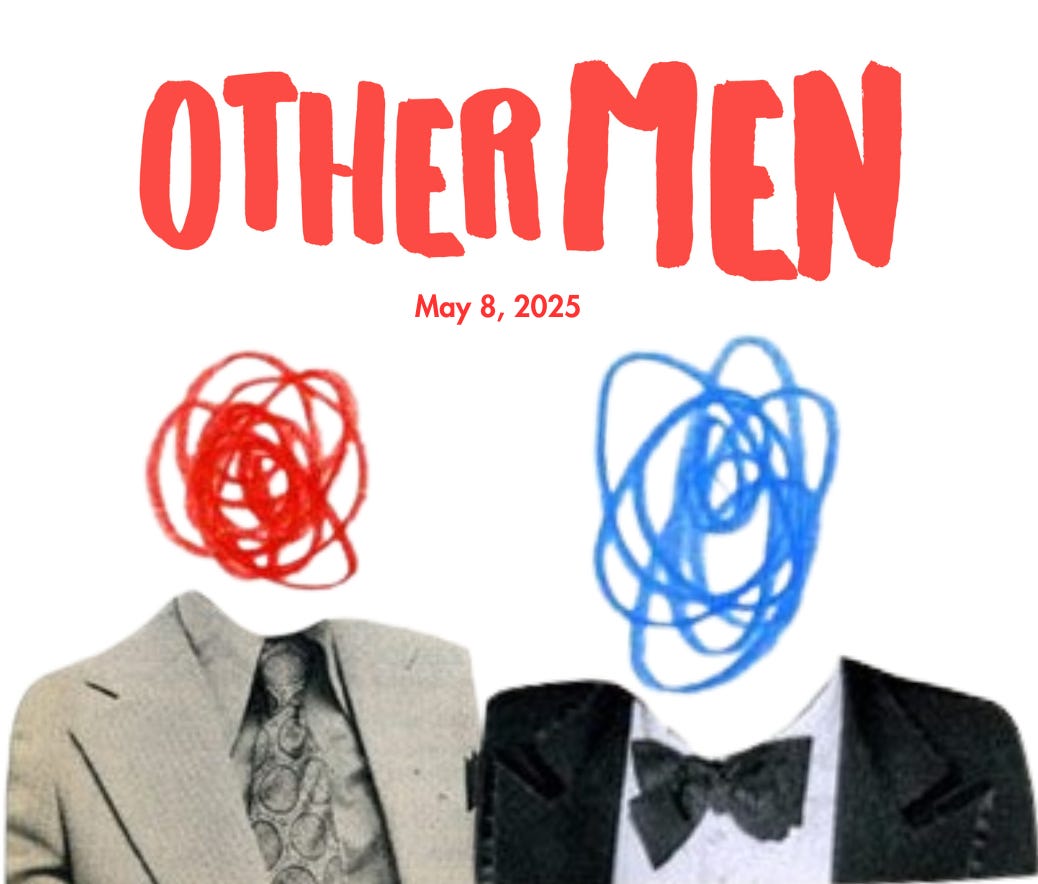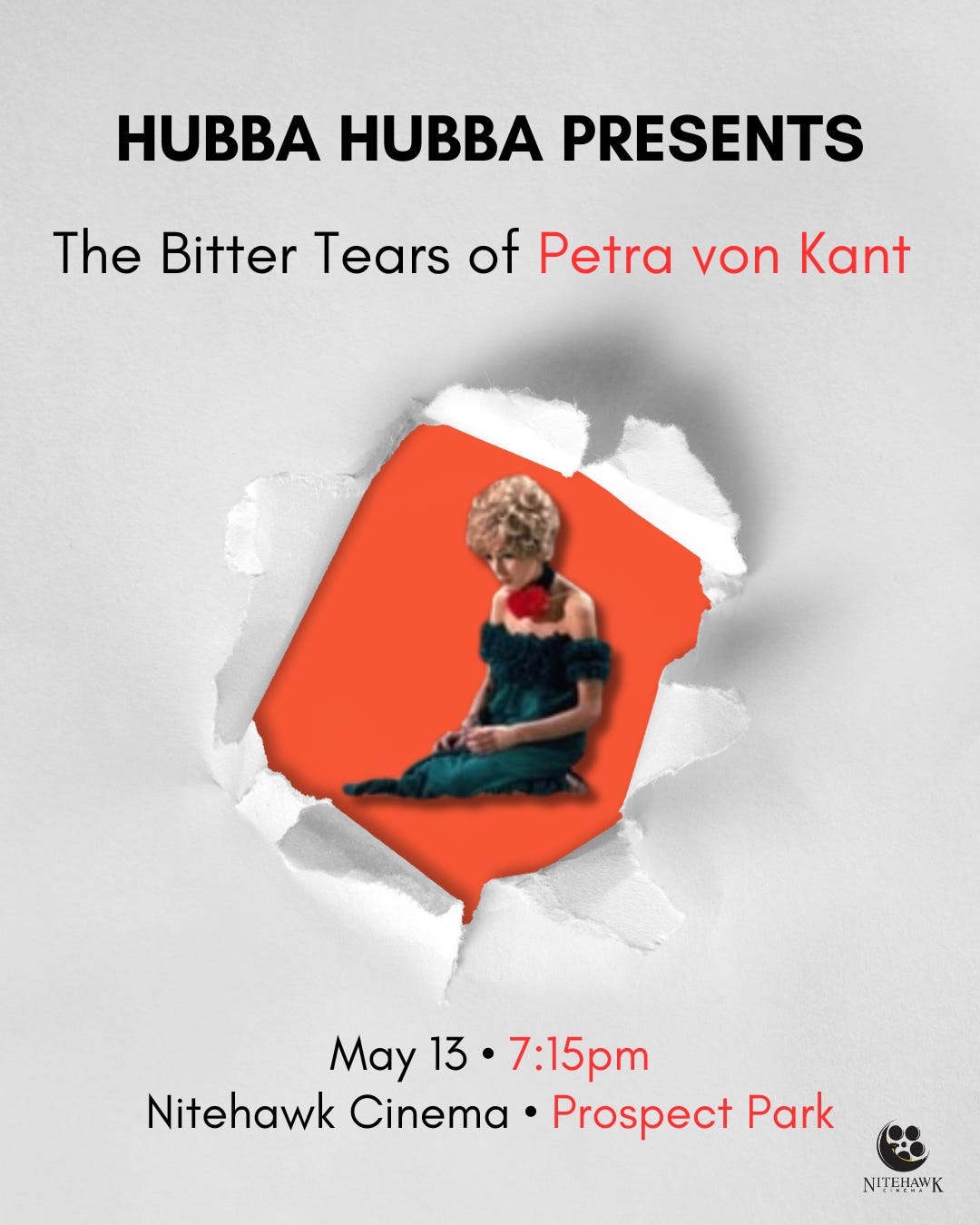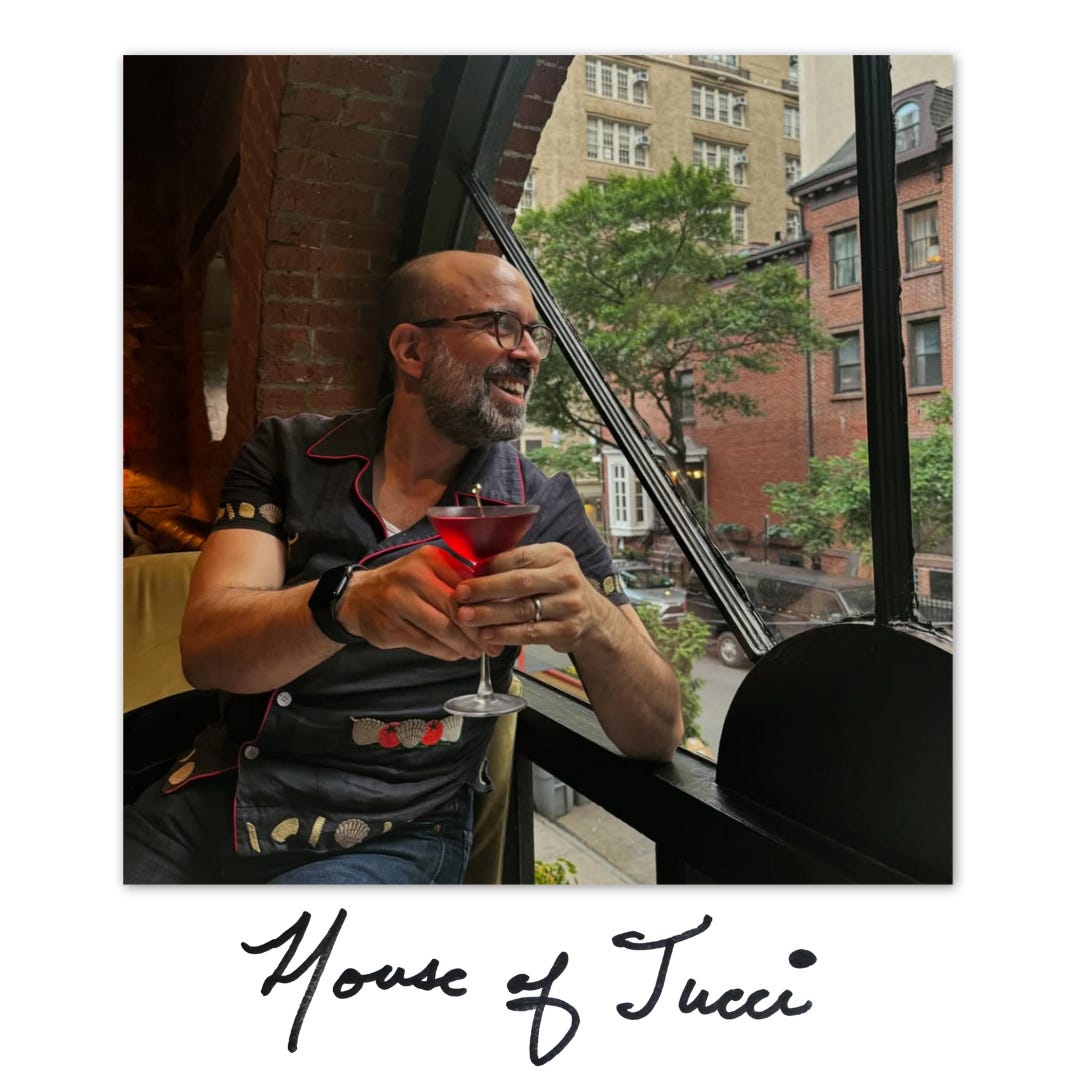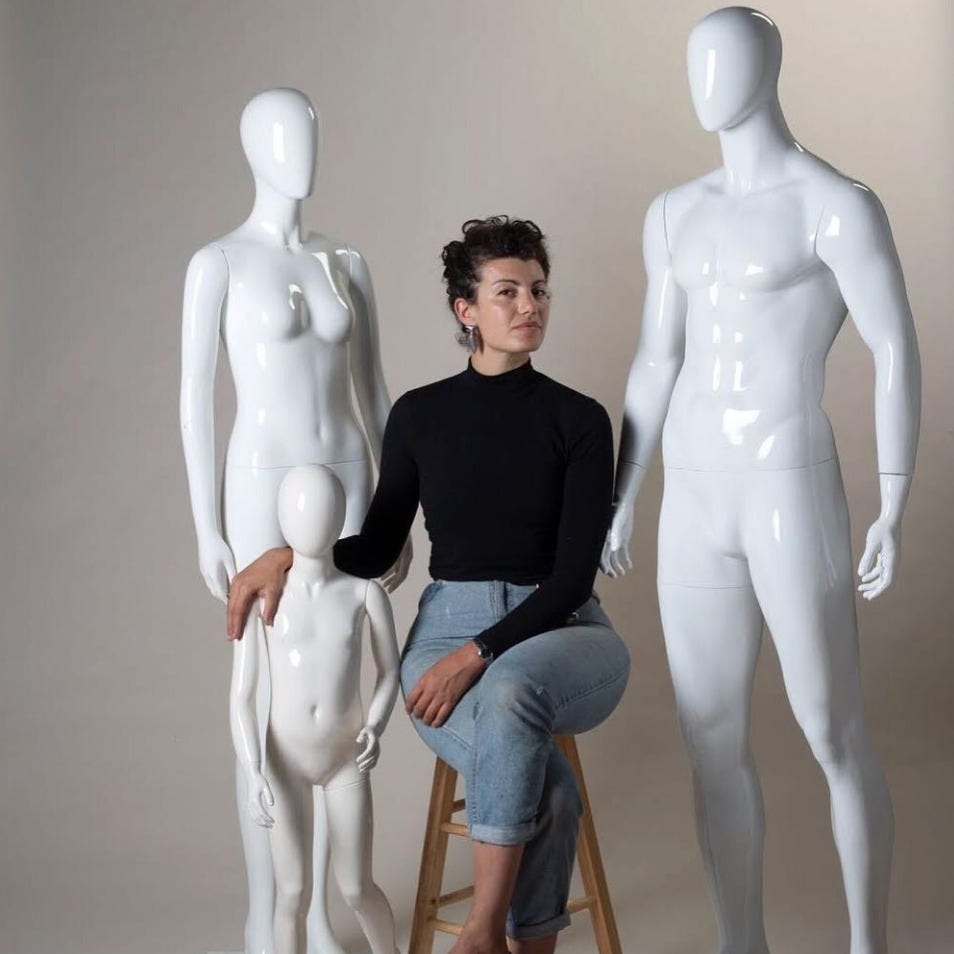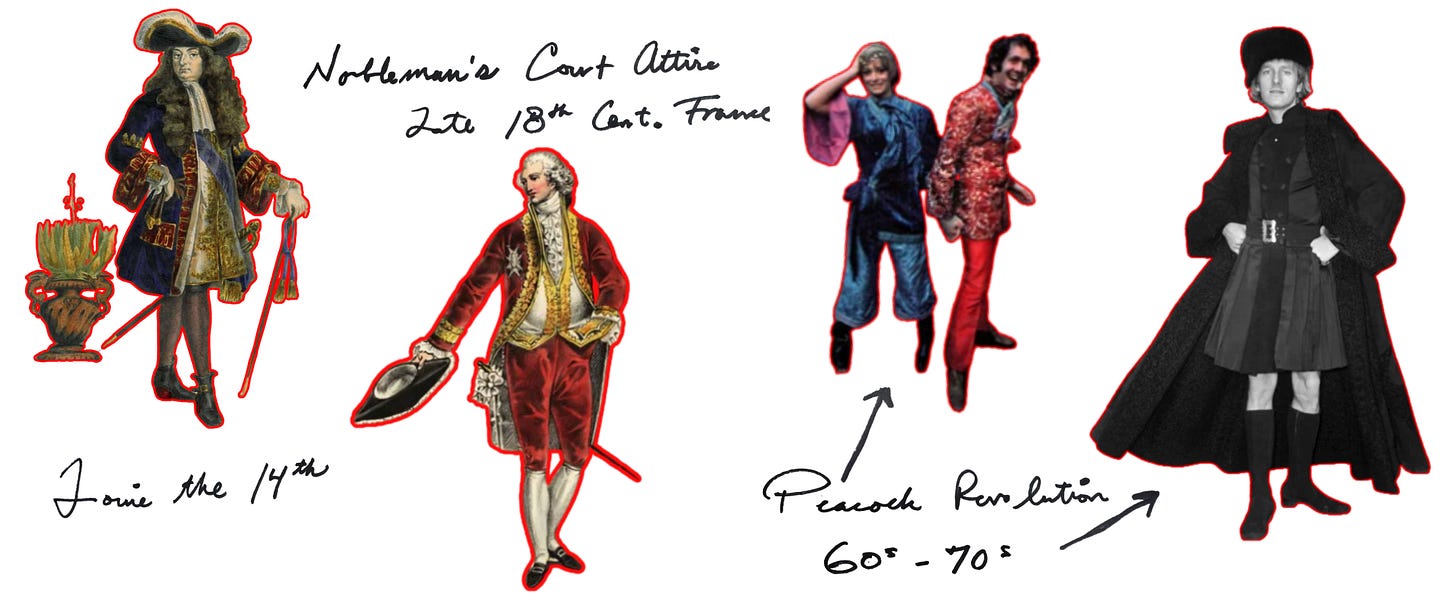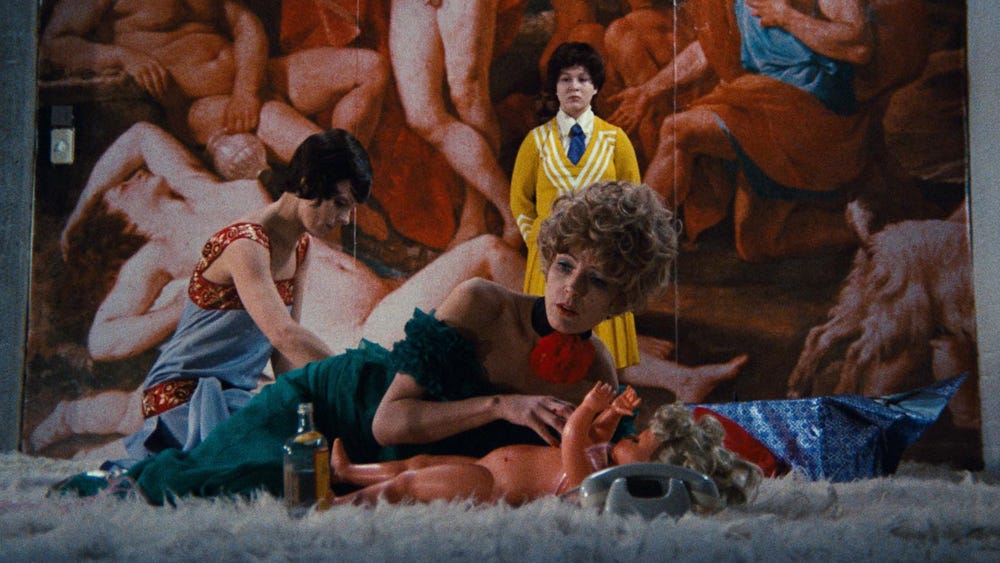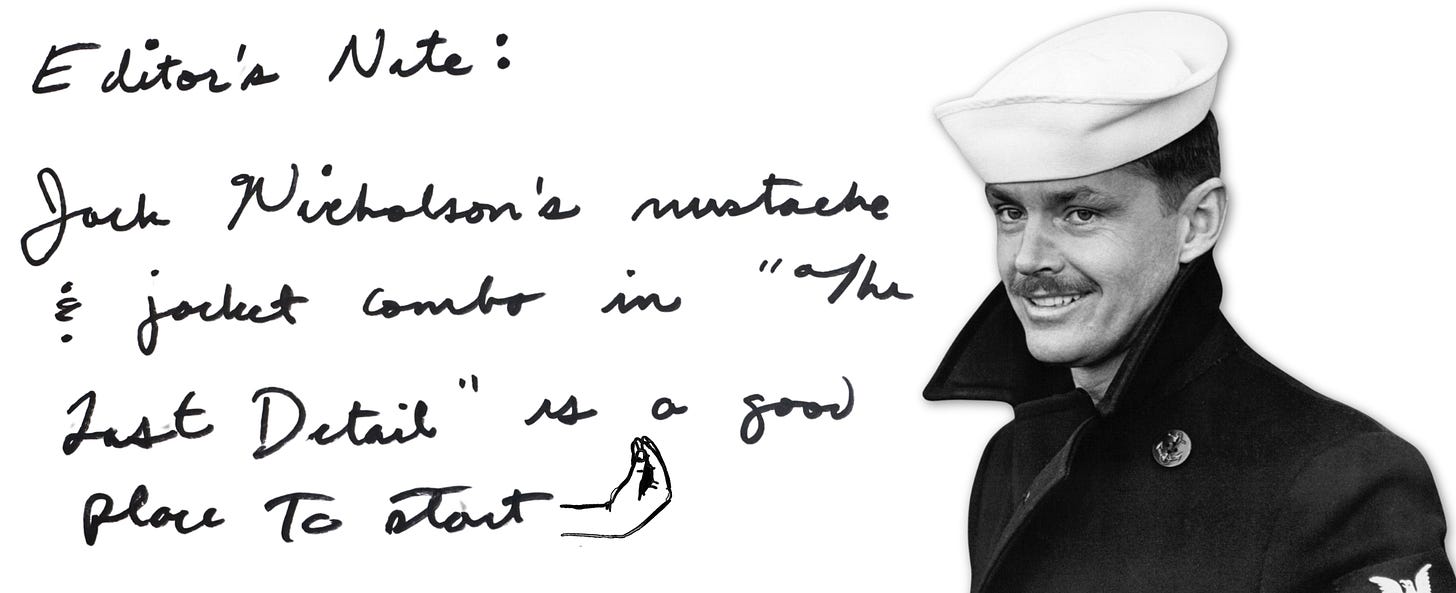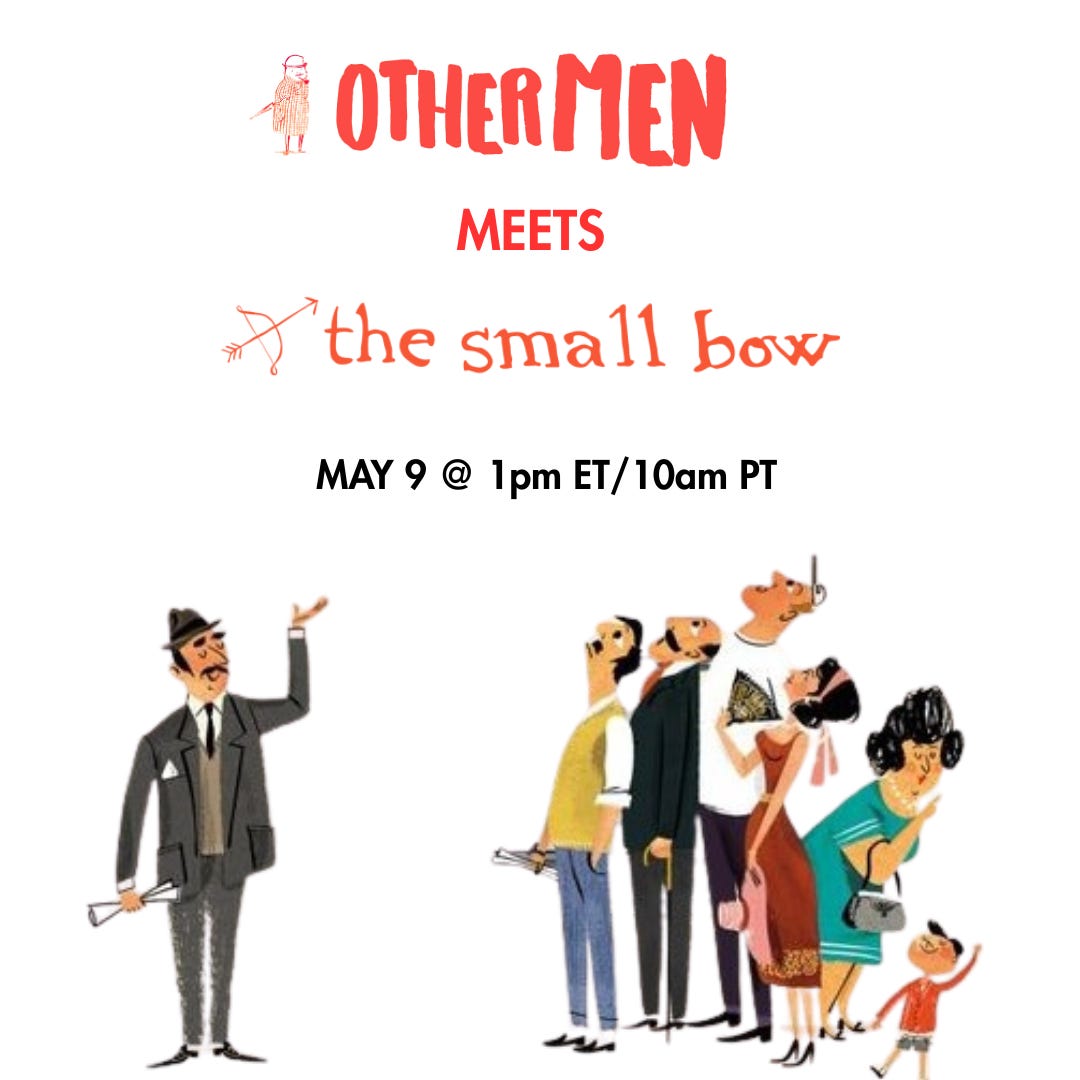Masculinity in Style: A Conversation with Avery Trufelman on Fashion and Feeling
More of a why to wear guide.
Hubba Hubba is back!
Join our team along with with the magnificent Avery Trufelman (interviewed in today’s issue) on Tuesday, May 13th at Nitehawk Cinema-Prospect with what may be the most intoxicatingly stylized love story of the 1970s—The Bitter Tears of Petra von Kanton 35mm!
When I interviewed Ames Beckerman a few years ago, I showed up at his house in Atlanta dressed in a sports coat and slacks. A bit taken aback, Ames thought he needed to dress more formally for our chat. I told him that I had just come from the airport and while I generally like to dress “well” (as open an interpretation to the eye of the beholder), I often fly with a special outfit, harkening back to the sophisticated threads from midcentury air travel.
I send today’s post out to you, my dearest, as I scoot over to JFK for a cross-country flight. My latest spring/summer air travel outfit includes a groovy Tombolo button-up with beautiful embroidery of pasta, pomodoro tomatoes, and mariscos galore. Since I can’t eat shellfish, I tell people I wear them instead. The shirt is a hit at airports and on the streets—it’s certainly the closest I’ll get to being mistaken for someone who hosts a tv show about culinary Italy.
Among the few labels I’ve adopted, “shirt guy” is the most recent and frequent. I am now a sage of top coverage in my circle of friends. While I can’t claim expertise, fashion is important to me—I enjoy helping people find the right food-related atire that best suits them.
Avery Trufelman is my go-to recommendation for anyone seeking insight into fashion, whether it’s advice, history, or cultural context. Her podcast, Articles of Interest, is, at its core, about what we wear. But each episode takes that simple premise and unpacks it with depth and curiosity, as Trufelman traces a thread from a specific garment or trend outward, revealing how it became woven into our cultural identity, for better or worse. In anticipation of our upcoming Hubba Hubba screening of The Bitter Tears of Petra von Kant, I invited Trufelman to lend her sharp, stylish perspective to some of the questions I’ve heard from Other Mens.
This interview has been edited for length and clarity.
While many label fashion as a performance, you’ve said fashion is about people. At Other Men, we believe masculinity, while definitely a reflection of people, is also very much about performance. What do you think fashion reveals about masculinity that other disciplines don’t?
Fashion reveals a lot about masculinity in what it doesn't say, the sort of rigid rules that men are supposed to follow or the certain colors that they're supposed to wear. In some ways, I envy it. It's like a more streamlined uniform. But yeah, it's not novel to say that men don't have the range and dynamism that women's wear affords.
However, it does have a little bit more of a tradition and rigidness to it. And this all goes back to a very decisive moment called The Great Male Renunciation. You look at old portraits, oil paintings of, like, Louis the 14th or Noblemen, and they are wearing heels. They're wearing jewels, they're wearing lace. They are decked out. And there's this moment that is especially tied to the rise of democracy and the common man after the French Revolution, after the American Revolution, that everybody wants to dress to be rational. We are all rational actors. We have no kings anymore. We are all citizens who are able to vote and have to make rational decisions.
This, of course, only applies to white men who are considered frivolous and not capable of a vote. Women, indigenous people, Black people, people who historically have not been allowed the right to vote or hold jobs or speak out and have no way to reflect their own personality, but on their only property, which is their own bodies.
And so it emerges from this place of incredible privilege, and I think many, many, many, minority groups have spent a long time working towards the privilege of getting to dress boring or speaking with ways beyond their clothes. But I think there's a middle ground where we can all meet. And I think it's beautiful that we're entering a new era where maybe not as wild as it was and say the Peacock revolution in the 60s and 70s, but I think we are entering a time where men are able to express themselves a little bit more.
We often talk about “taste” as a kind of flex, with the masculine versions of that frequently advertised with emblems like watches, whiskey, or tailoring. How have you seen fashion weaponized or softened in the context of masculinity?
It's funny, I'm actually working on a series about the military and how the military impacts almost everything about men's wear. Most men's clothes are derived from, if not contemporary military clothes, 20th century military clothes, outdated clothes, surplus clothes, clothes that are based in a form of utility that had instructions and zippers and capabilities.
I do think masculinity gets tied up with clothing and that these clothes are supposed to perform. They're supposed to have capabilities. You know, ‘look what my car can do. Look what my watch can do.’ It's not acceptable to be like ‘I'm just wearing this thing because I like it.’ It has to be about how waterproof it is, how practical it is, how, you know, roughed up.
It's very hard to just be like, ‘I thought this was a pretty color.’
As a storyteller who investigates systems of culture, what’s a moment in your own life when clothing or style made you feel powerful—or maybe exposed something vulnerable?
I feel like I never felt it more powerfully than when I was a kid in school.
And I remember the day that I decided to wear something different. My aunt had gone on some sort of vacation, I don't even remember where, but she brought me back these rainbow patterned beaded earrings and I wore them to middle school. They're sort of stuff that an eccentric aunt would wear, they're not stuff that a teenager would wear. And I wore them. And all day, everyone was like, ‘nice earrings, nice earrings, nice earrings.’ Not necessarily in a bad way, but not necessarily in a good way and I remember I felt so vulnerable. I felt like there was a spotlight on me all day for just standing out.
And I remember actually at the end of the day, it felt like I ran a marathon. I was kind of seeing how long I could keep these things in my ears, and at the end of the day, I pulled them off and I threw them in the trash. I just had this really strong, visceral reaction to it, and it didn't stop me.
I think it was the door that sort of put me on an endeavor to try to dress the way I want, but it showed me how hard it is, that it doesn't actually make life easier, at least not initially. It drew unwanted attention. It gave other people license to just speak freely about me and my body and my choices in a way that I wasn't exactly comfortable with.
But then it got to the point where I started just doing whatever I wanted, and people got used to the fact that like, ‘Oh, Avery's gonna do whatever she wants,’ and then they stopped commenting on it as much, and then I truly felt free. But it felt like building up a muscle to get there. And I think it's really difficult for people to understand that it's a trial and error process of building up your own style.
And unfortunately, it's quite public and therein lies the bravery.
Articles of Interest often shows how everyday objects are full of invisible meaning. If you were to create a season just on “menswear and emotion,” what garments or stories might make the cut? And do you think the aesthetics of masculinity are changing—or just becoming more niche and coded?
Honestly, I always thought it'd be interesting to do a story about the necktie. A friend gave me one and I was never into wearing ties, but a friend gave me a really cool one and I was like, ‘Oh, I'm gonna start wearing this.’
And I realized I didn't know how to tie a tie. So I had to watch all these YouTube videos of teenage boys being like, ‘OK guys, here's how you tie a tie.’ And it was this beautiful rite of passage to think of boys learning this, practicing this, teaching each other this. There's something ritualistic about it that I find very beautiful.
Petra von Kant is a fashion designer whose personal and professional relationships blur in ways that are tender, toxic, and theatrical. What drew you to The Bitter Tears of Petra Von Kant, and what do you think it says about power and taste?
This is a deeply stylish film. It's obviously based on Fassbender himself and his own relationship with one of his actors, and he so clearly decided to switch genders and switch professions and is like, ‘Oh, instead of being a film director, she'll be a fashion designer.’
And so the interesting thing about it is there's not much that's actually about fashion design in the movie other than the fact that the costumes are spectacular. There's nothing that pertains very accurately to the profession itself. In fact, you never see the titular character, Petra, designing anything, and she seems entirely too languid to be working on the schedule that a fashion designer would be working on.
I don't think it's a particularly accurate reflection of the fashion world per se, but I do think it says a lot about the ways that professional, powerful people can be undone by the thing they don't have, which is, I guess youth and some sort of Adonis proxy for themselves.
The other thing about it is you could say that this is a parable about power and taste. And then when you watch the movie, you'll see Hanna Schygulla come on screen and you'll be like, ‘Man, who wouldn't wanna fuck her? She's so pretty. She's so fricking pretty.’ So there's also something a little visceral there.
What advice would you give to someone (especially a guy) who wants to understand their personal style, but doesn’t feel ‘allowed’ to care?
Well, first, I'll give you a pat on the arm and say ‘That's okay buddy.’ Honestly, I think there are inroads that can feel safe. Obviously, if you have a wedding coming up or an event coming up, I think there's permission in little ways to start looking into a suit.
Maybe go to a tailor or see if you can buy an off the rack suit and then go get it fitted. Just do a little research, start there. Be like, ‘OK, I'm gonna have a nice suit.’ That's huge. That would be amazing.
Just move one item at a time. And you can treat each one as a sort of research project. Look at old pictures from World War II or movies that you like, things that feel undeniably masculine. Look at stuff you want to emulate.
Go physically touch some things, go to a store and, you don't even necessarily have to buy things, but just touch things. Get an idea of what quality you like, what size you like. Go on eBay. Go on gem.app, it's an aggregator that helps you find vintage clothes online.
The thing about shopping is I think it’s the worst when it's in a big batch. When people are like ‘I've gotta change my look and everything about me, and I hate it.’ Like, don't do that. It's gonna be sloppy. It's not gonna be good. As quickly as you get them, you're gonna quickly tire of them. So go slowly, go one at a time and it'll sort of be like those earrings I wore in middle school.
As you slowly expand your horizons – it might take a little bravery at first – everybody else will expand with you. When you show up wearing a cool jacket, maybe the first day everyone's gonna be like, ‘Whoa, what are you wearing? Nice jacket.’ And then they'll get on with their day and they'll get over it.
So, yeah, start slow and feel free to use whatever manly role models you might need.
What can you tell us about the upcoming season of Articles of Interest?
It's about the military. This is one for you, boys. You'll like it.
Finally—what are you wearing to the Petra von Kant screening? And should we all be as dramatic as Petra?
I guess I should wear something dramatic, right? I don't know. I tend to wear the same thing most days, which is like a version of a collared shirt and a suit jacket.
Just 'cause I find it's comfortable and it fits most scenarios. But, now you're inspiring me. Maybe I should wear something wild. OK, Mark, challenge accepted, maybe I will. And yes, we should all be as dramatic as Petra. If that's what makes us feel comfortable and the context allows it, we live in a society.
Join Avery and I on Tuesday, May 13th at Nitehawk Cinema-Prospect, and see what we’re wearing for our screening of The Bitter Tears of Petra von Kant on 35mm!
Adios, ciao ciao, byeeeeeeeee,
Mark✌🏼
One more event, friend:
On Friday, we've got quite a chat for you.
For those who've been scared recently.
For those in recovery.
For those thinking of recovery.
All are welcome to join us for coffee or lunch—depending on where you are tuning in from—as A.J. Daulerio of
and I examine the pesky world of something he’s wonderfully dubbed, Little Boy Shit.FREE! RSVP HERE




